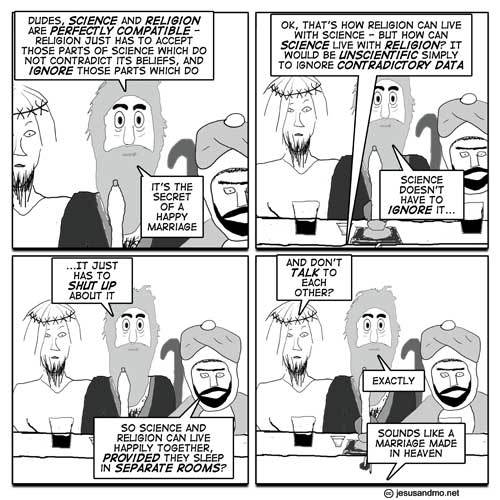A question that gets asked frequently is are science and religion compatible. The answer, to me, is an unequivocal 'sometimes'. I know, sounds pretty wishy-washy to me as well, but allow me a moment to explain.
When some people are asked about this issue they remind us that many scientists were/are also religious and than many theologians were/are also scientists. You know from that context, science and religion are completely compatible.
OK, so that leads to the question of when are science and religion not compatible? I think the issue there isn't so much that they are incompatible as philosophies, I think the problem is in how we use them. I'm not sure I am being clear. Let me try again. When one uses science to determine an answer to an issue one uses a methodology based on logic and reasoning. When one determines an answer based on religion one is using faith. Here is the problem, what if they are examining the same issue and the answers are different? Do we then have a conflict between science and religion? We most certainly do.
I think the question to me is 'should we?' That one I am not sure how to answer. Because of my own background I am uncomfortable assigning specific actions to God. I mean I cannot prove God helped me find a job, meet my wife, or . . . well you have your own list of things you might feel God intervened for you. But while you might have offered thanks to God, you really cannot prove that God helped you out, it's a matter of faith. So from my own worldview, there really isn't much of a conflict. I don't tend to put a lot of credence in assigning responsibility to God, and therefore I am rarely conflicted over it.
However there are other worldviews, and asking someone to change their viewpoint is tantamount to asking them to accept a new religion -- hence the conflict.
There are lots of arguments about science being nothing but another religion -- which I completely disagree with for reasons you can read about in many other posts. But the bottom line is that we are never going to eliminate conflict. The best we can hope for is to limit the arena for airing the conflict. The public school science classroom is not the appropriate arena for airing this conflict. It is not an issue of free speech, it is not an issue of academic freedom. The public school science classroom should be reserved for those things determined through logic and reason. Students should learn the methodology and history of scientific thought as well as exploring the different sciences themselves.
I can still remember testing thermodynamics by heating and bending tubes of glass, dissecting my first frog, mixing chemicals that overflowed the test tube, much to the dismay of my Chemistry teacher Mr. Kennedy. I remember my sister's test of whether or not commercial mouthwashes killed germs, to some surprising results! These can be exciting things and should not be withheld from students because some members of some religious groups wish to require their worldview as the only one!
Science does not drive people away from religion, I believe that religions are perfectly capable of driving people away themselves. I also believe that people who don't like the answers they get from science may be drawn toward a particular religious viewpoint. People who fear other viewpoints do more damage to their own than I could ever do.
Conflicts will continue, the best we can hope to is minimize the impact to education. We do that by setting standards, training our teachers, and monitoring and mentoring to insure the standards are met. We hold workshops to help teachers address controversial issues. We publicly address this issue in school board meetings, articles, letters to the editor, and even blogs. We elect officials to support a quality science education and when needed we seek redress when that education is compromised. Plus if our worldview conflicts with that, we can always elect to send our children to a non-secular school that supports only our viewpoint.
Like I said conflicts will happen, but they should not happen at the expense of the education of our kids. (image source)
(image source)
Wednesday, July 15, 2009
Science and Religion Compatibility
Labels: academic freedom, education, humor, science, science standards
Subscribe to:
Post Comments (Atom)



I look at science as a process. But it is a tool limited to an identified and quantifiable question. It's the aggregate of knowledge derived from this process that seems to bother some people. I don't see how you can use science and "reason" as some sort of magic philosophy of day to day life. Who's got time to gather enough information to be that careful? And who would be crazy enough to volunteer to replicate your findings? I don't like atheists or theists hijacking science to back up their own philosophical beliefs. They may as well be claiming ownership of the hammer or circular saw.
ReplyDeleteWho are the scientists of today? Where do they work? What motivates them? As science increasingly shapes our cultural moment, the identity of its practitioners is also evolving.
ReplyDeleteI think they are similar they both belive in absolutes that are arbitrary the difference is that science belives in inference departing from that absolut thing.
I do not think they can be compatible cause both are too similar to stop fighting among each other and saying why one should be chosen and the other discarded. The only choice would be that the budhist come by and act as mediators and enlightners to them.